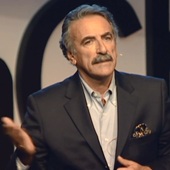“Want to Help Someone? Shut Up and Listen.”
Ernesto Sirolli, whose sustainable economic development projects are in place globally, says that the key to really helping communities is not to initiate, not to motivate, but to “become a servant of the local passion.”
Topics
Leading Sustainable Organizations

Ernesto Sirolli, whose economic development projects are in place globally, says that the key to really helping communities is to “become a servant of the local passion.”
“I decided when I was 27 years old to only respond to people, and I invented a system called Enterprise Facilitation.”
That’s Ernesto Sirolli, founder of the Sirolli Institute, an international non-profit that teaches community leaders how to establish and maintain sustainable economic development projects. Sirolli presented his work in a recent TED talk, “Want to help someone? Shut up and listen!“
Much of Sirolli’s development experience in counties such as Kenya, Ivory Coast and Australia are within the NGO world.
But Sirolli offers a point of view about working with people that’s intriguing even for for-profit managers.
The idea behind Enterprise Facilitation, he says, is that “you never initiate anything, you never motivate anybody, but you become a servant of the local passion, the servant of local people who have a dream to become a better person.”
What you do, he says, is “you shut up.” You don’t just arrive with new ideas to impose on people. You don’t barrel forward with your own point of view. You get rid of your savior complex. You listen.
“The most important thing is passion,” Sirolli says. “You can give somebody an idea. If that person doesn’t want to do it, what are you going to do? The passion that the person has for her own growth is the most important thing.” In his work, he says, his goal is to help people find the knowledge they need to succeed.
His institute has worked in 300 communities around the world helping to start 40,000 businesses, he says.
Watch the full 17:10 minute talk here:
